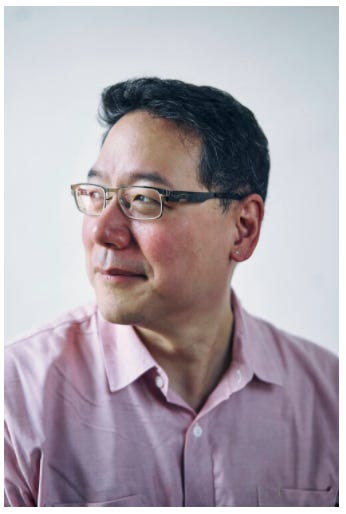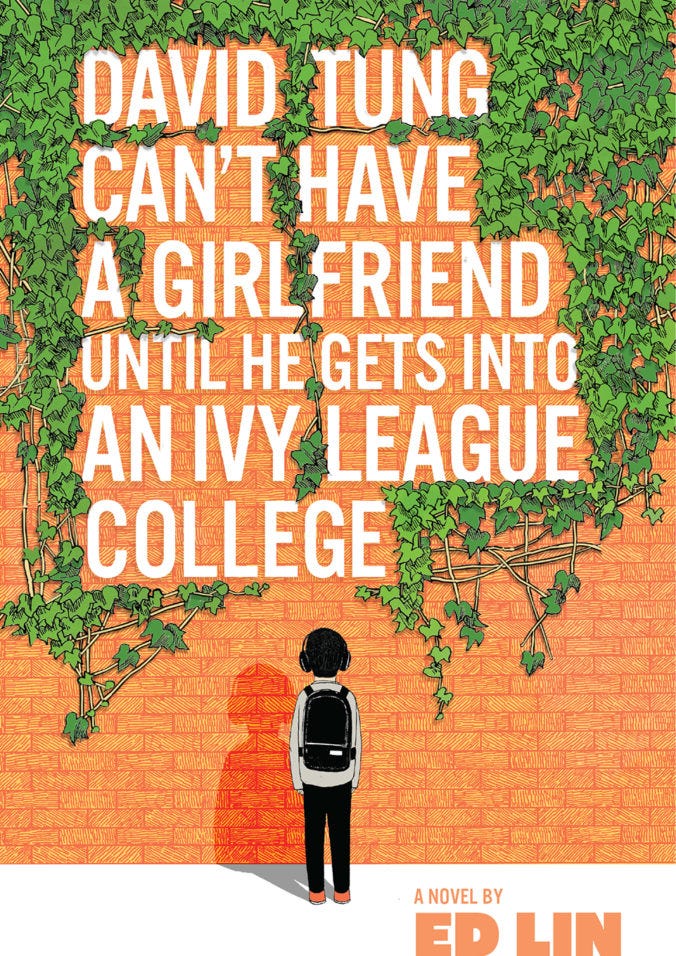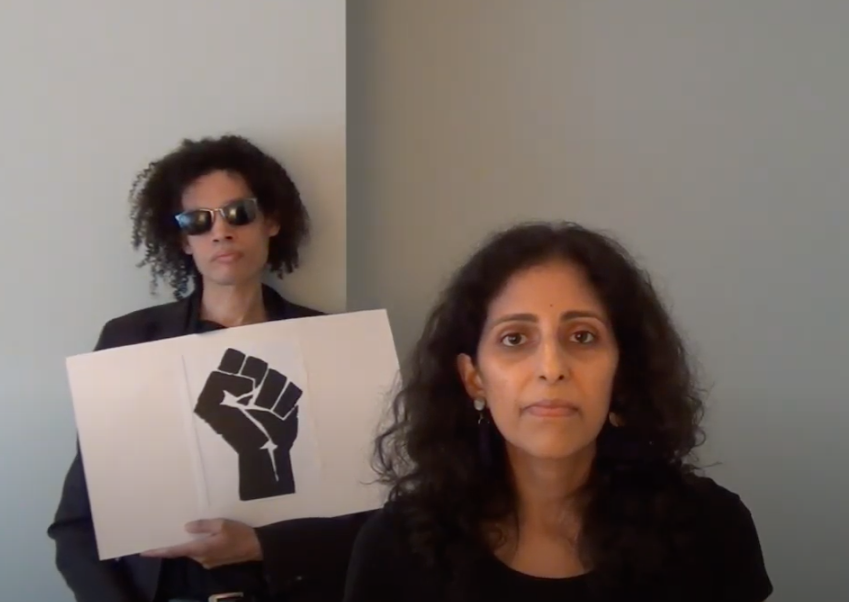Welcome to Blackshop: a column that thinks about allyship between BIPOC people, brought to you by Nina Sharma and Quincy Scott Jones.

I met Ed Lin while working at The Asian American Writers’ Workshop just over ten years ago. Ed performed in a mixtape-themed reading that I curated and ran a writing workshop. On stage and in class, Ed was always the same — a funny dude with great music taste who really loved his writing communities.
What’s wonderful about community writing workshops is how they draw people from many different walks of life, and Ed’s was no different. I believe in ours we had a stonecutter, or maybe that was just his email handle; a young woman who rarely spoke unless she was reading and then she unleashed some wild, unforgettably amazing prose that imagined alternate storylines for Hester Prynne; and a young woman who wrote a beautiful family narrative, who loved the class so much that she wanted to intern at AAWW, but I had already accepted all my interns…so instead, she used that story to win a Fulbright. It’s been over ten years since the workshop ended, but I still remember it because Ed made things memorable.
I introduced Quincy to Ed’s work because as two Jersey-raised kids who still fight about where exactly Central Jersey is (and if it even exists! don’t get Q started…), we needed good literature to stop the feud. From the tight corners of the Jersey Shore to landlocked Shark Beach, Ed’s Jersey landscape does not settle this feud so much as feed our hunger for more stories. We were so excited to talk to Ed about his most recent novel, David Tung Can’t Have a Girlfriend Until He Gets Into an Ivy League College, a book that is equal parts enlightenment and escapism, all wrapped up in coming of age goodness.
— Nina Sharma

Blackshop: Let’s talk about David Tung. As the title suggests, there’s a correlation between David Tung’s academic success and his ability to date. And yet David, though already reading sample MCAT questions, doesn’t seem charmed by the myth of the model minority. He seems more inclined to evade or defy any kind of labeling. This comes out so palpably in the theme of clothing, in David’s descriptions of his own style (“How do I usually dress? I tend to favor a green-and-black checked shirt tucked into brandless jeans. In class photos, I’m underdressed as hell”); in the designer apparel of his peers (whose labels and coordination David keenly observes, makes them look “like the same team in home and away uniforms”); and, likewise, in how they tease David, as in Jean Chu’s “David, what are you wearing?” Can you speak to your choice of a brandless, ordinary and “underdressed as hell” hero and how materialism is tied into the model minority story?
Ed Lin: I grew up in Jersey in the ’80s, and my school certainly wasn’t Asian-majority. Now, though, there are parts of the state that are 50% Asian, and that would mean that percentage is a lot higher for schools. Much of what I put into David Tung is [from] my experience of going to Columbia University and being thrown into this population of Asians who were incredibly wealthy and savvy in ways that I wasn’t. East and South Asians, both born here and from abroad, were wearing super-expensive clothes to class like it was a fashion show (they staged fashion shows, too) and had fake IDs for clubs. Everyone seemed to know each other from Stuy[vesant], or Phillips Exeter or whatever. Shirts and jeans from the racks of Caldor, and punk rock, that was me. Columbia did have people from all economic levels, but the Asians as a group seemed the most well-off. Maybe that spoke of the higher bar to get in. I pulled that experience back into the high school years, and combined it with the Asian-rich and rich-Asian world of contemporary northern Jersey. There are books that talk about how we struggle against racism from the white kids, but for this book, my thought was, “We have our own issues.” I wanted to focus on them, and not give any space or respect to white supremacy.
I think a lot of the materialism in the Chinese/Taiwanese/Hong Konger diaspora is an artificial marker of individual achievement. Bigger house, better car, nicer clothes means you’ve “made it.” And yet, it’s a fragile front. How much debt are you carrying? Yeah, you have all this nice stuff, but aren’t you, like most Americans, one or two paychecks away from homelessness? I will say this: broke Asians can hustle. I knew a guy back in college who used credit cards (there were always offers in the student mailboxes) to buy leather jackets from a wholesaler, and he sold them to the rich kids for cash.
Blackshop: Waylaid and David Tung strike two different tones and yet both narrators exist in a similar universe as family business-working Asian American Jersey kids, and, ultimately, as both narrators are coming of age and into their desires. Waylaid’s narrator goes unnamed but his desires are centered from the opening line: “I was about 12 years old when I knew I had to get laid soon.” David’s desires come out more like a “behaviorial slip,” as he says this to Betty when she catches him looking at Brandy Chu’s tits with Chun. Why is it important for you to tell stories about the body and desire? Your characters have a sense of humor, even David’s clinical phrasing “behaviorial slips” had an amazing awkwardness to it! How do you tell stories of desire with so much humanity, i.e. stories of boning with a funny bone?
Ed Lin: Coming of age includes becoming more aware of your body. For the immigrant parents, because they’re adults, they’ve already learned self-denial. They can work crappy hours at crappy jobs and conduct themselves with stoic discipline. They have a game plan to make it in the U.S. and they’re sticking to it. If they allowed themselves to access their feelings, there’s no way they could endure. But their kids grow up not understanding really what they’re feeling both emotionally and hormonally. And because their parents are too tired or otherwise unwilling to talk to them about their maturing feelings and bodies, the kids seek guidance from peers or mentors who are likely flawed.
How could this not be funny, even if just from recognition of our own fumblings at that age? You’re making me think of the Fishbone song, “Bonin’ in the Boneyard”!
Blackshop: One of our favorite parts of This Is a Bust is the allyship between Chow and Vandyne, how they compare their experiences being Chinese and Black in 1976 New York. Allyship seems to be something that David is thinking through as well. We’re thinking of David’s his awareness that “being fresh off the boat is a complex issue for many Asians,” an awareness that seemed to have come with time and as the population of the Shark Beach school system itself changed, we’re thinking of his awareness that his Chinese school friends aren’t all of the “same tribe,” and we’re thinking even his kinship with his 20 Questions texting-mate, the biracial Yaro. How important was it for you to highlight the plurality of identities in 21st century David Tung?
Ed Lin: It is completely important for me to complicate identity of what may be perceived of a monolithic Chinese American community. There are cultural, political, and economic strata that slice the shit out of everything. David’s mother doesn’t have a high opinion of Cantonese speakers, probably because many have a stereotypical association of that dialect’s speakers with manual labor and low education. Yet she herself works in a restaurant, once a quintessential Cantonese-speaker’s job, and David’s father’s best friend is a Cantonese guy who crucially delivers groceries to their restaurant. They say that a conquered country’s gods become the conqueror’s demons, and considering the long history of people killing each other in what is now China, it’s not surprising that different enclaves aren’t on the best terms. I didn’t want to come out and be like, “Taiwan is an independent country!” But there are elements to read into — some less overt than others — that indicate the complexity of the people. And Taiwan is an independent country, btw.
Blackshop: Ed, you’re a funny guy and you certainly bring humor to David Tung. You also capture the sense of anxiety that comes with high school, the constant hyper-vigilance of the American high school experience. Now that we all seem to be in a state of hyper-vigilance, what do you see as the role of comedy in our lives?
Ed Lin: You need a sense of humor to live. Why do you think the Dalai Lama laughs like a maniac? Shouldn’t he be all morose over being exiled from Tibet by the Chinese, and the state of his people? No. He’s focused on the long game, which extends beyond this incarnation.
We don’t need to think beyond our lives to have some perspective. People who give you a hard time and obstacles never last. My first boss at my first job with benefits was really horrible to me. She even told me that I didn’t know the difference between rewriting a press release and writing a story. Years later, she tried to connect with me on LinkedIn. I accepted and then blocked her to send a mixed message. Later, I saw that she had been downsized, and I had to chuckle.
Humor isn’t meant to distract from matters at hand. It is a tool to keep things in perspective and lift morale while continuing to get into good trouble.
Blackshop: In 25 words or less, how we gonna come up?
Ed Lin: We will inevitably rise like heat.

About Blackshop
Anti-racism conversations still often occur in a black-white binary. From articles with a direct address, “White people, here’s how…” to decrying the harm of Karen and Kevin, this moment of increased awareness over racism is well…whitewashed. As a couple, we are always considering what Afro-Asian allyship means to us, the socio-political realities we negotiate both within and without their coupledom. “Blackshop” came to us while we were discussing our dreams of opening a store that centers the arts and culture — records, movies, performances — of people of color. This column is in the spirit of that imagined community. It is a space where we engage with a creative community of color, from poets and prose writers to comedians and graphic comic writers, rich discussions to collectively consider what allyship “for us, by us” really looks like.
About Us
Nina Sharma is a writer and performer from Edison, New Jersey. Her work has been featured in journals such as New Yorker, Electric Literature, Women’s Studies Quarterly, Anomaly, Longreads, and The Margins. Her most recent essay, “Shithole Country Clubs,” has been named an Editors’ Pick at Longreads. As of date, “Shithole Country Clubs” is the most read essay of the year on its site of publication, The Margins.
Nina is a proud recipient of the Diversity Scholarship at the Magnet Improvisation Theater where she has performed in “Hearts and Stars,” “Mixtape: The Diversity Improv Show,” “You Are Not Alone: An Uplifting Show about Depression” and “True Colors.” She is a co-founder and member of the all-South Asian American female improv group, Not Your Biwi. For more on the ties between her comedy and essay writing, check out “Getting in Touch with the Absurdity of Our Lives,” her Kenyon Review interview with Rosebud Ben-Oni.
Nina is formerly the Programs Director at the Asian American Writers’ Workshop. She has an MFA from Columbia’s School of the Arts writing program. A 2017 and 2018 Asian Women Giving Circle grantee, she leads her AWGC-funded workshop, “No-Name Mind: Stories of Mental Health from Asian America” at AAWW and across New York City. She currently teaches at Barnard College and Catapult.
Quincy Scott Jones is the author of the The T-Bone Series (Whirlwind Press, 2009) and the upcoming How to Kill Yourself Instead of Your Children (C&R Press, 2021). His work has appeared in the African American Review, The North American Review, Love Jawns: A Mixtape, and The Feminist Wire as well as anthologies Resisting Arrest: Poems to Stretch the Sky, COVID Chronicles: A Comics Anthology, and Black Lives Have Always Mattered: A Collection of Essays, Poems, and Personal Narratives. His graphic narrative, Black Nerd, is in the works.
Blackshop Tries to Get Into an Ivy League School: A Conversation with Ed Lin was originally published in Anomaly on Medium, where people are continuing the conversation by highlighting and responding to this story.
